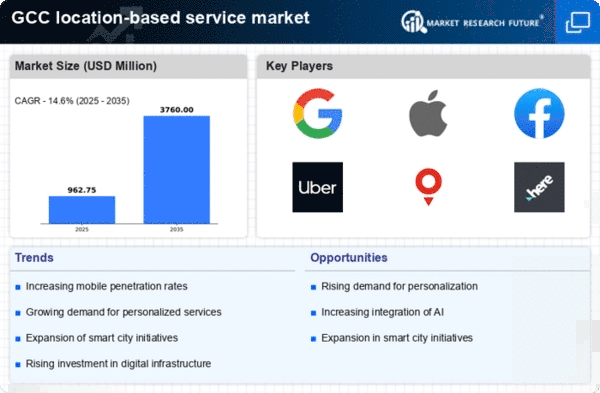Rising Smartphone Penetration
The location based-service market in the GCC is experiencing a notable surge due to the increasing penetration of smartphones. As of 2025, smartphone adoption in the region stands at approximately 90%, facilitating access to various location-based applications. This trend is likely to enhance user engagement and drive demand for services that utilize GPS technology. The proliferation of affordable smartphones has made it easier for consumers to access location-based services, thereby expanding the market. Furthermore, the growing reliance on mobile devices for daily activities, such as navigation and food delivery, indicates a shift in consumer behavior. This shift is expected to propel the location based-service market forward, as businesses adapt to meet the evolving needs of tech-savvy consumers.
Expansion of E-commerce Platforms
The location based-service market is significantly influenced by the rapid expansion of e-commerce platforms within the GCC. As online shopping continues to gain traction, businesses are increasingly leveraging location-based services to enhance customer experiences. In 2025, e-commerce sales in the region are projected to reach $30 billion, with a substantial portion attributed to location-based marketing strategies. Retailers are utilizing geolocation data to offer personalized promotions and improve delivery logistics, thereby increasing customer satisfaction. This trend suggests that the integration of location-based services into e-commerce strategies is becoming essential for businesses aiming to remain competitive. Consequently, the location based-service market is likely to benefit from this growing intersection of technology and retail.
Increased Demand for Real-time Information
The location based-service market is witnessing a surge in demand for real-time information, driven by consumer expectations for instant access to data. In the GCC, users increasingly seek services that provide timely updates on traffic conditions, weather forecasts, and local events. This trend is particularly evident in navigation and ride-sharing applications, where real-time data is crucial for enhancing user experience. As of 2025, the market for real-time location-based services is projected to grow by 25%, reflecting the importance of immediacy in consumer interactions. Businesses that can effectively harness real-time data are likely to gain a competitive edge, thereby propelling the location based-service market forward.
Government Initiatives and Smart City Projects
Government initiatives aimed at developing smart cities in the GCC are playing a pivotal role in shaping the location based-service market. Various countries in the region are investing heavily in infrastructure that supports advanced technologies, including IoT and location-based services. For instance, the UAE's Smart Dubai initiative aims to enhance urban living through innovative solutions that utilize geolocation data. Such projects are expected to create a conducive environment for the growth of the location based-service market, as they promote the adoption of smart technologies. The alignment of government policies with technological advancements indicates a promising future for the market, as public and private sectors collaborate to enhance urban experiences.
Growing Interest in Location-based Advertising
The location based-service market is benefiting from a growing interest in location-based advertising among businesses in the GCC. As companies seek to optimize their marketing strategies, they are increasingly turning to geolocation data to target consumers more effectively. In 2025, it is estimated that location-based advertising will account for 30% of total digital advertising spend in the region. This shift indicates a recognition of the value of personalized marketing, as businesses aim to reach consumers at the right place and time. The potential for higher engagement rates and conversion through targeted advertising is likely to drive further investment in location-based services, thereby enhancing the overall market landscape.
















